Contemporary Hospitality Industry Report: Travelodge Analysis
VerifiedAdded on 2023/01/23
|14
|3813
|58
Report
AI Summary
This report provides a comprehensive analysis of the contemporary hospitality industry, focusing on various aspects to encourage students to consider careers within this sector. It begins with an introduction to the hospitality industry, highlighting its importance and the services it offers, followed by a focus on Travelodge as a case study. The report then delves into different types of businesses within the hospitality sector, detailing their products and services, and explores the range of operational and functional departments within a hospitality business. It also examines the industry's contribution to local, national, and international economies. The report further discusses the range of operational roles within the industry, reviewing the necessary skills for each. Macro-environmental factors, including political, social, technological, legal, environmental, and economic influences, are analyzed, along with a SWOT analysis of a hospitality organization. The report concludes with an analysis of current and potential trends impacting the hospitality industry in the UK.
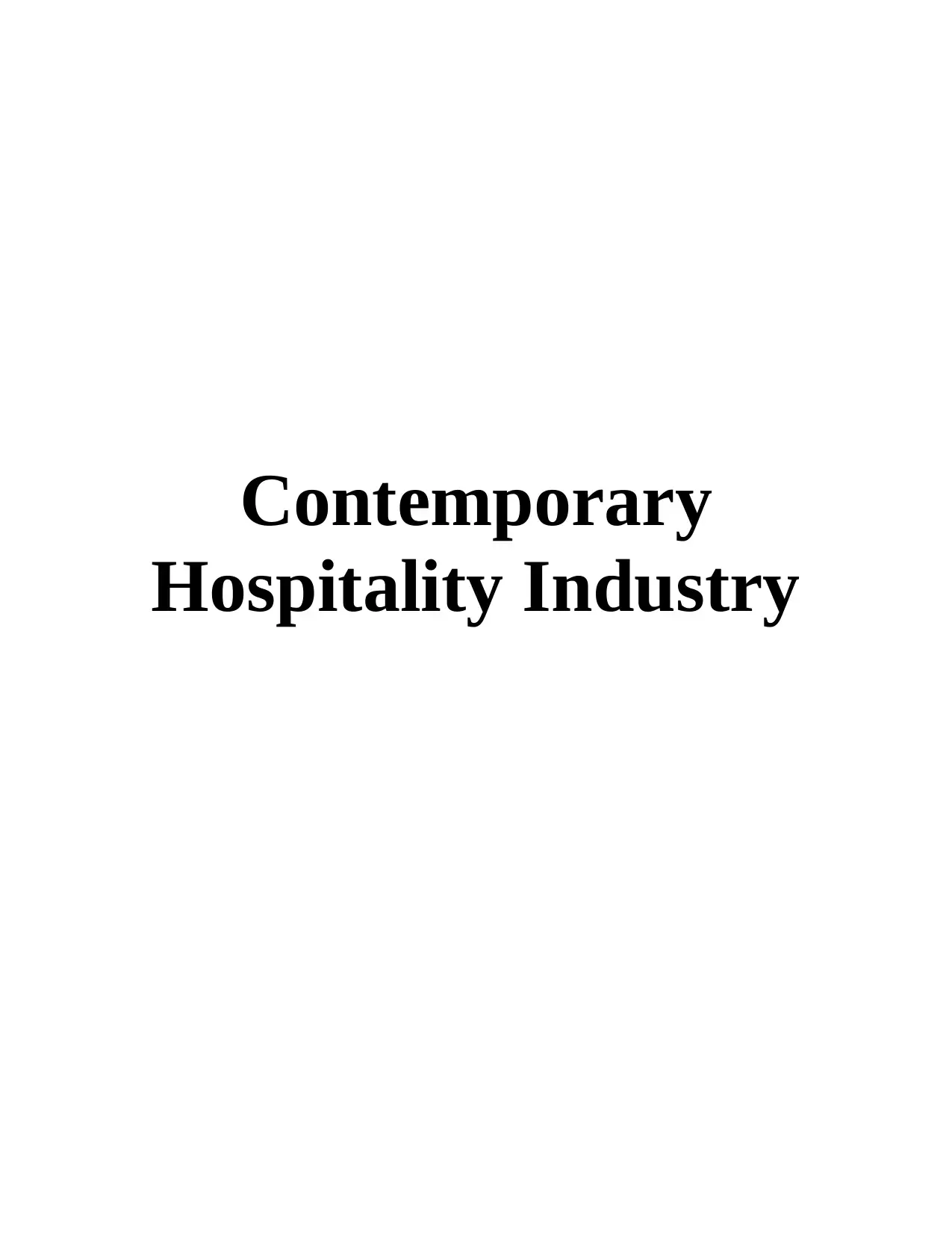
Contemporary
Hospitality Industry
Hospitality Industry
Paraphrase This Document
Need a fresh take? Get an instant paraphrase of this document with our AI Paraphraser
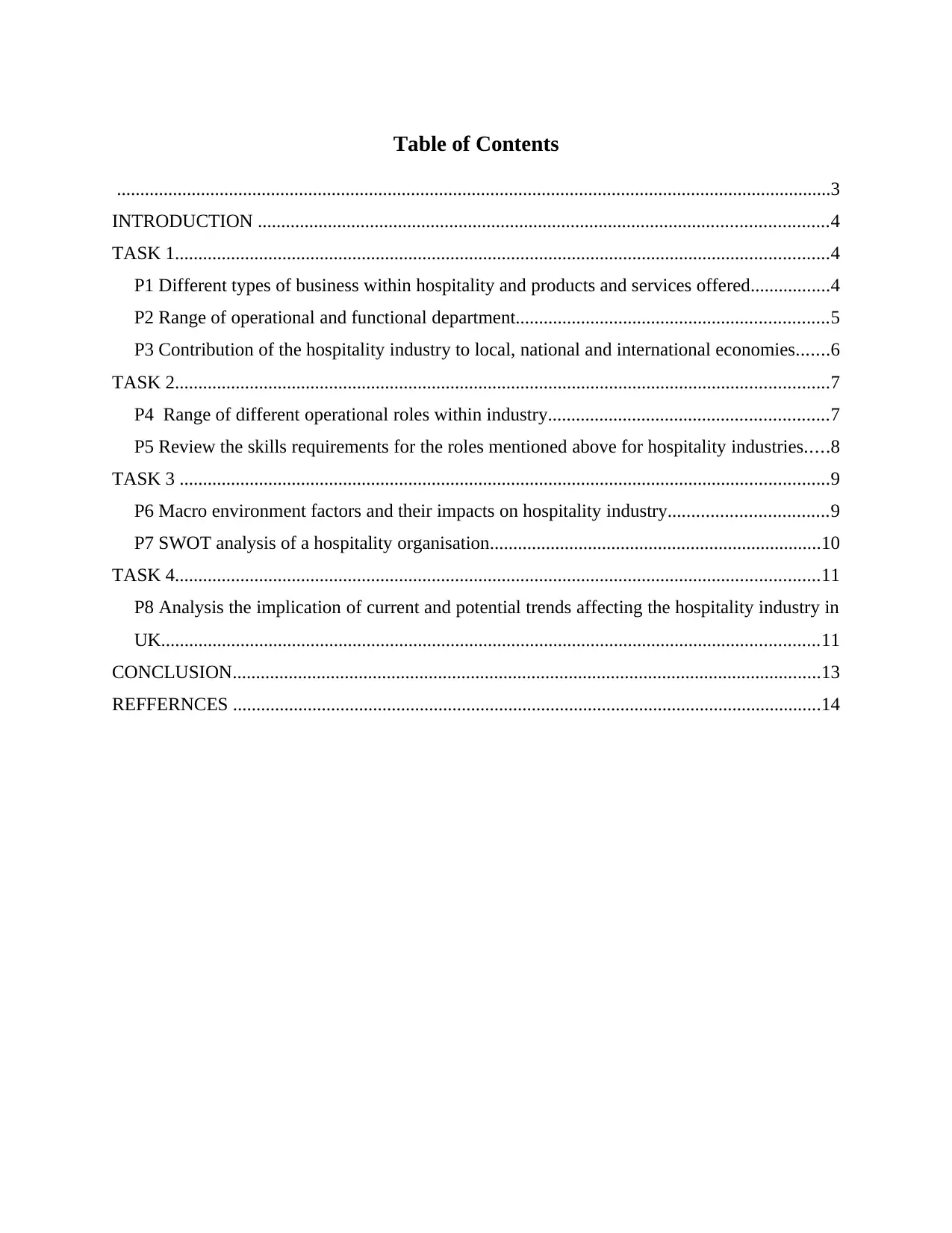
Table of Contents
.........................................................................................................................................................3
INTRODUCTION ..........................................................................................................................4
TASK 1............................................................................................................................................4
P1 Different types of business within hospitality and products and services offered.................4
P2 Range of operational and functional department...................................................................5
P3 Contribution of the hospitality industry to local, national and international economies.......6
TASK 2............................................................................................................................................7
P4 Range of different operational roles within industry............................................................7
P5 Review the skills requirements for the roles mentioned above for hospitality industries.....8
TASK 3 ...........................................................................................................................................9
P6 Macro environment factors and their impacts on hospitality industry..................................9
P7 SWOT analysis of a hospitality organisation.......................................................................10
TASK 4..........................................................................................................................................11
P8 Analysis the implication of current and potential trends affecting the hospitality industry in
UK.............................................................................................................................................11
CONCLUSION..............................................................................................................................13
REFFERNCES ..............................................................................................................................14
.........................................................................................................................................................3
INTRODUCTION ..........................................................................................................................4
TASK 1............................................................................................................................................4
P1 Different types of business within hospitality and products and services offered.................4
P2 Range of operational and functional department...................................................................5
P3 Contribution of the hospitality industry to local, national and international economies.......6
TASK 2............................................................................................................................................7
P4 Range of different operational roles within industry............................................................7
P5 Review the skills requirements for the roles mentioned above for hospitality industries.....8
TASK 3 ...........................................................................................................................................9
P6 Macro environment factors and their impacts on hospitality industry..................................9
P7 SWOT analysis of a hospitality organisation.......................................................................10
TASK 4..........................................................................................................................................11
P8 Analysis the implication of current and potential trends affecting the hospitality industry in
UK.............................................................................................................................................11
CONCLUSION..............................................................................................................................13
REFFERNCES ..............................................................................................................................14

⊘ This is a preview!⊘
Do you want full access?
Subscribe today to unlock all pages.

Trusted by 1+ million students worldwide
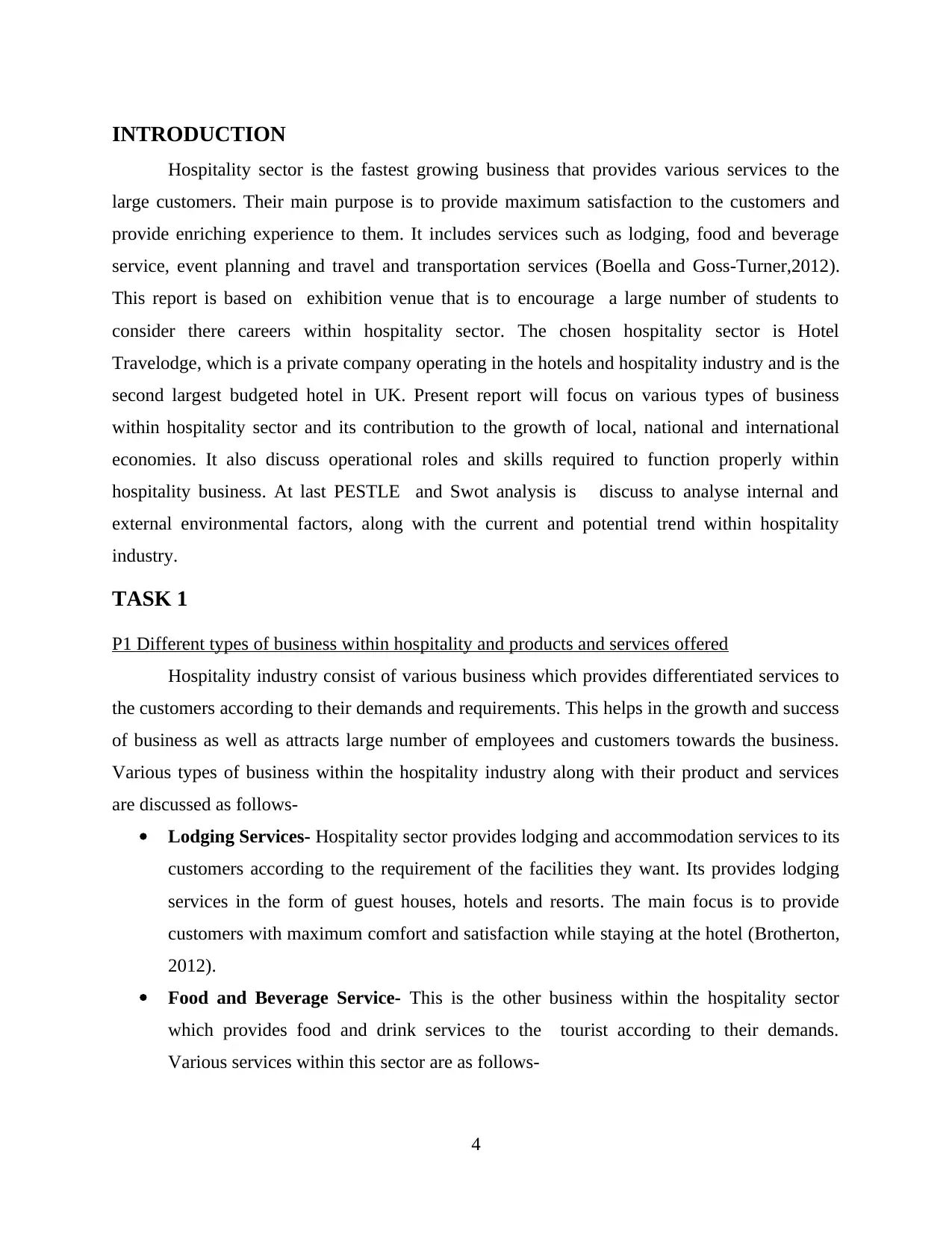
INTRODUCTION
Hospitality sector is the fastest growing business that provides various services to the
large customers. Their main purpose is to provide maximum satisfaction to the customers and
provide enriching experience to them. It includes services such as lodging, food and beverage
service, event planning and travel and transportation services (Boella and Goss-Turner,2012).
This report is based on exhibition venue that is to encourage a large number of students to
consider there careers within hospitality sector. The chosen hospitality sector is Hotel
Travelodge, which is a private company operating in the hotels and hospitality industry and is the
second largest budgeted hotel in UK. Present report will focus on various types of business
within hospitality sector and its contribution to the growth of local, national and international
economies. It also discuss operational roles and skills required to function properly within
hospitality business. At last PESTLE and Swot analysis is discuss to analyse internal and
external environmental factors, along with the current and potential trend within hospitality
industry.
TASK 1
P1 Different types of business within hospitality and products and services offered
Hospitality industry consist of various business which provides differentiated services to
the customers according to their demands and requirements. This helps in the growth and success
of business as well as attracts large number of employees and customers towards the business.
Various types of business within the hospitality industry along with their product and services
are discussed as follows-
Lodging Services- Hospitality sector provides lodging and accommodation services to its
customers according to the requirement of the facilities they want. Its provides lodging
services in the form of guest houses, hotels and resorts. The main focus is to provide
customers with maximum comfort and satisfaction while staying at the hotel (Brotherton,
2012).
Food and Beverage Service- This is the other business within the hospitality sector
which provides food and drink services to the tourist according to their demands.
Various services within this sector are as follows-
4
Hospitality sector is the fastest growing business that provides various services to the
large customers. Their main purpose is to provide maximum satisfaction to the customers and
provide enriching experience to them. It includes services such as lodging, food and beverage
service, event planning and travel and transportation services (Boella and Goss-Turner,2012).
This report is based on exhibition venue that is to encourage a large number of students to
consider there careers within hospitality sector. The chosen hospitality sector is Hotel
Travelodge, which is a private company operating in the hotels and hospitality industry and is the
second largest budgeted hotel in UK. Present report will focus on various types of business
within hospitality sector and its contribution to the growth of local, national and international
economies. It also discuss operational roles and skills required to function properly within
hospitality business. At last PESTLE and Swot analysis is discuss to analyse internal and
external environmental factors, along with the current and potential trend within hospitality
industry.
TASK 1
P1 Different types of business within hospitality and products and services offered
Hospitality industry consist of various business which provides differentiated services to
the customers according to their demands and requirements. This helps in the growth and success
of business as well as attracts large number of employees and customers towards the business.
Various types of business within the hospitality industry along with their product and services
are discussed as follows-
Lodging Services- Hospitality sector provides lodging and accommodation services to its
customers according to the requirement of the facilities they want. Its provides lodging
services in the form of guest houses, hotels and resorts. The main focus is to provide
customers with maximum comfort and satisfaction while staying at the hotel (Brotherton,
2012).
Food and Beverage Service- This is the other business within the hospitality sector
which provides food and drink services to the tourist according to their demands.
Various services within this sector are as follows-
4
Paraphrase This Document
Need a fresh take? Get an instant paraphrase of this document with our AI Paraphraser
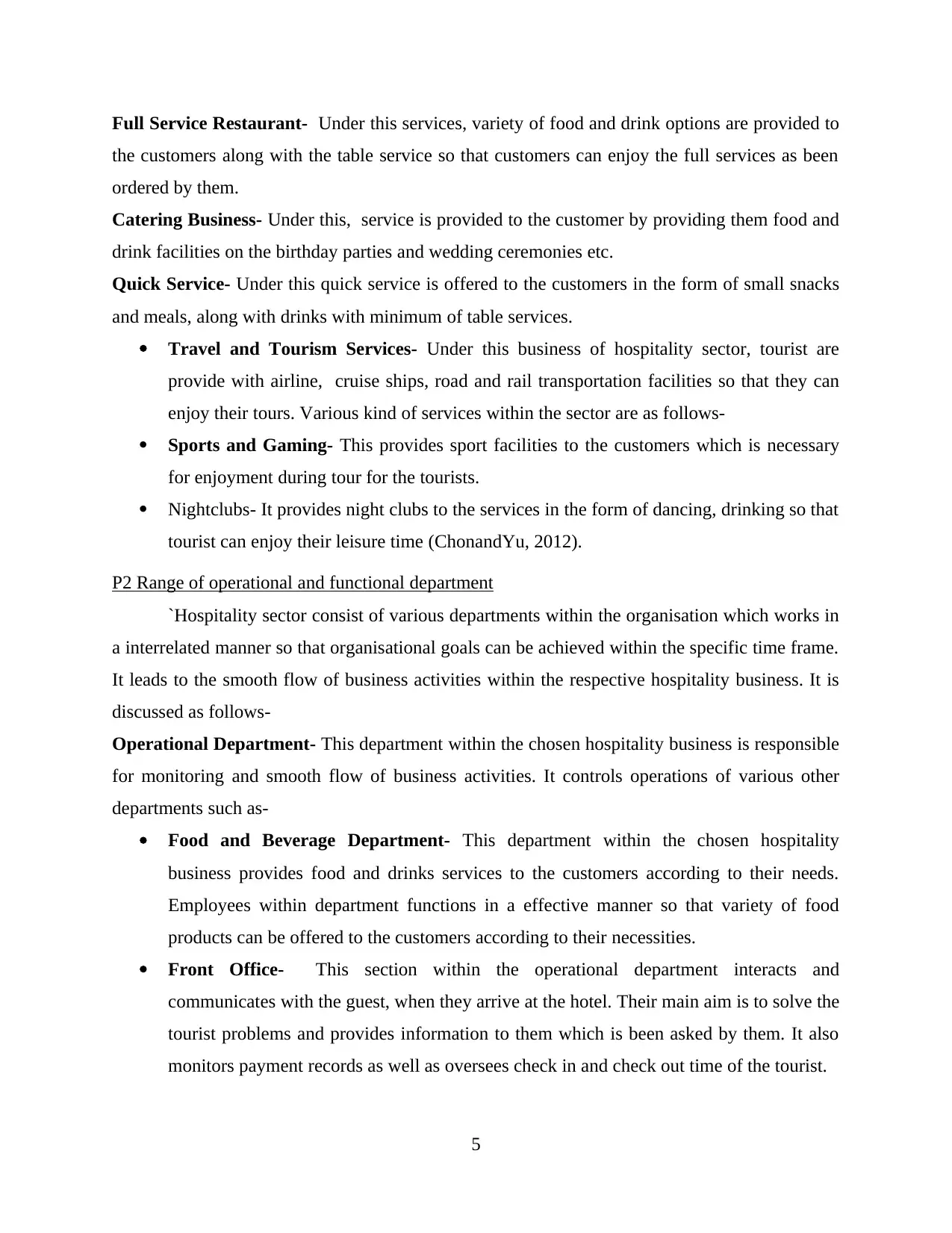
Full Service Restaurant- Under this services, variety of food and drink options are provided to
the customers along with the table service so that customers can enjoy the full services as been
ordered by them.
Catering Business- Under this, service is provided to the customer by providing them food and
drink facilities on the birthday parties and wedding ceremonies etc.
Quick Service- Under this quick service is offered to the customers in the form of small snacks
and meals, along with drinks with minimum of table services.
Travel and Tourism Services- Under this business of hospitality sector, tourist are
provide with airline, cruise ships, road and rail transportation facilities so that they can
enjoy their tours. Various kind of services within the sector are as follows-
Sports and Gaming- This provides sport facilities to the customers which is necessary
for enjoyment during tour for the tourists.
Nightclubs- It provides night clubs to the services in the form of dancing, drinking so that
tourist can enjoy their leisure time (ChonandYu, 2012).
P2 Range of operational and functional department
`Hospitality sector consist of various departments within the organisation which works in
a interrelated manner so that organisational goals can be achieved within the specific time frame.
It leads to the smooth flow of business activities within the respective hospitality business. It is
discussed as follows-
Operational Department- This department within the chosen hospitality business is responsible
for monitoring and smooth flow of business activities. It controls operations of various other
departments such as-
Food and Beverage Department- This department within the chosen hospitality
business provides food and drinks services to the customers according to their needs.
Employees within department functions in a effective manner so that variety of food
products can be offered to the customers according to their necessities.
Front Office- This section within the operational department interacts and
communicates with the guest, when they arrive at the hotel. Their main aim is to solve the
tourist problems and provides information to them which is been asked by them. It also
monitors payment records as well as oversees check in and check out time of the tourist.
5
the customers along with the table service so that customers can enjoy the full services as been
ordered by them.
Catering Business- Under this, service is provided to the customer by providing them food and
drink facilities on the birthday parties and wedding ceremonies etc.
Quick Service- Under this quick service is offered to the customers in the form of small snacks
and meals, along with drinks with minimum of table services.
Travel and Tourism Services- Under this business of hospitality sector, tourist are
provide with airline, cruise ships, road and rail transportation facilities so that they can
enjoy their tours. Various kind of services within the sector are as follows-
Sports and Gaming- This provides sport facilities to the customers which is necessary
for enjoyment during tour for the tourists.
Nightclubs- It provides night clubs to the services in the form of dancing, drinking so that
tourist can enjoy their leisure time (ChonandYu, 2012).
P2 Range of operational and functional department
`Hospitality sector consist of various departments within the organisation which works in
a interrelated manner so that organisational goals can be achieved within the specific time frame.
It leads to the smooth flow of business activities within the respective hospitality business. It is
discussed as follows-
Operational Department- This department within the chosen hospitality business is responsible
for monitoring and smooth flow of business activities. It controls operations of various other
departments such as-
Food and Beverage Department- This department within the chosen hospitality
business provides food and drinks services to the customers according to their needs.
Employees within department functions in a effective manner so that variety of food
products can be offered to the customers according to their necessities.
Front Office- This section within the operational department interacts and
communicates with the guest, when they arrive at the hotel. Their main aim is to solve the
tourist problems and provides information to them which is been asked by them. It also
monitors payment records as well as oversees check in and check out time of the tourist.
5
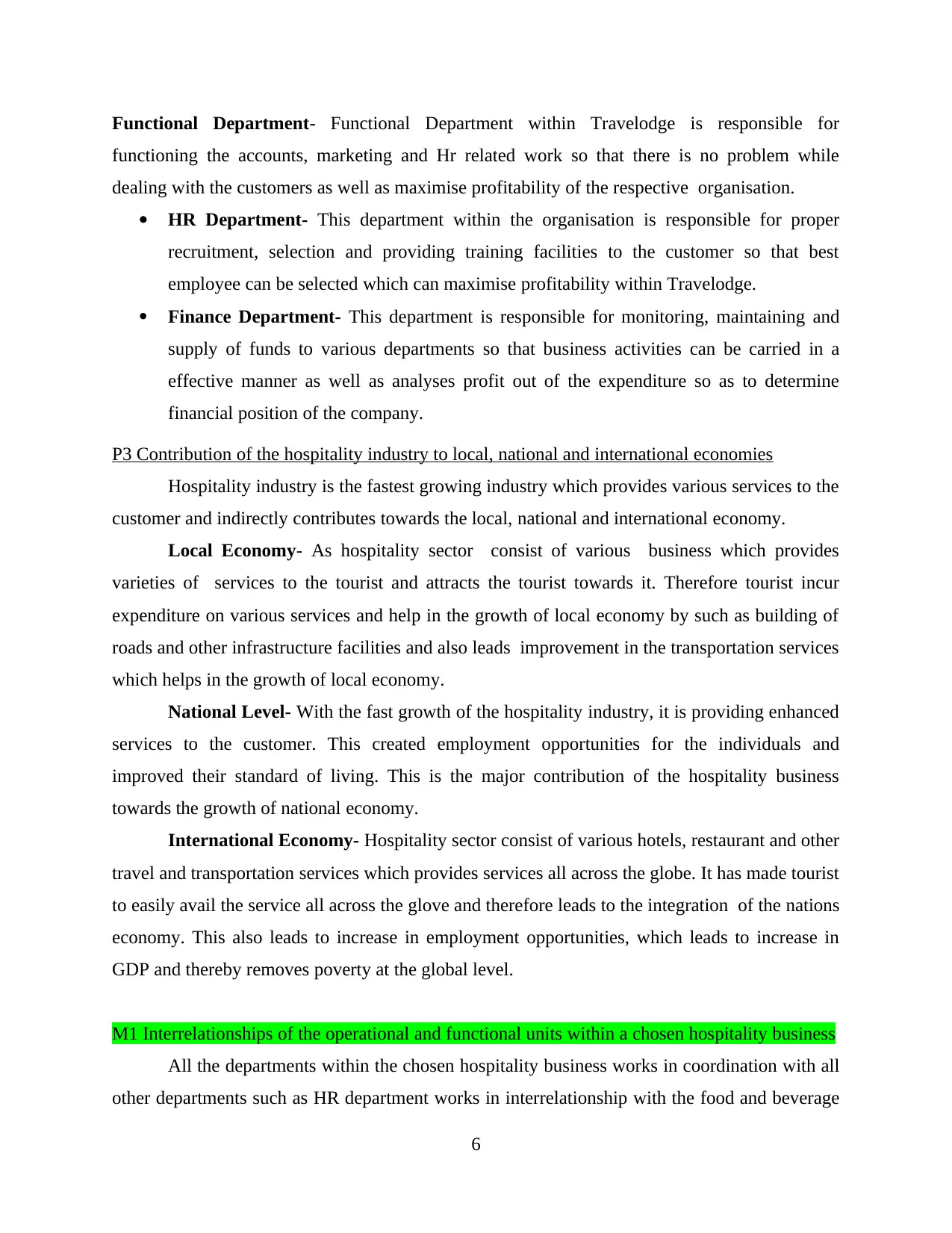
Functional Department- Functional Department within Travelodge is responsible for
functioning the accounts, marketing and Hr related work so that there is no problem while
dealing with the customers as well as maximise profitability of the respective organisation.
HR Department- This department within the organisation is responsible for proper
recruitment, selection and providing training facilities to the customer so that best
employee can be selected which can maximise profitability within Travelodge.
Finance Department- This department is responsible for monitoring, maintaining and
supply of funds to various departments so that business activities can be carried in a
effective manner as well as analyses profit out of the expenditure so as to determine
financial position of the company.
P3 Contribution of the hospitality industry to local, national and international economies
Hospitality industry is the fastest growing industry which provides various services to the
customer and indirectly contributes towards the local, national and international economy.
Local Economy- As hospitality sector consist of various business which provides
varieties of services to the tourist and attracts the tourist towards it. Therefore tourist incur
expenditure on various services and help in the growth of local economy by such as building of
roads and other infrastructure facilities and also leads improvement in the transportation services
which helps in the growth of local economy.
National Level- With the fast growth of the hospitality industry, it is providing enhanced
services to the customer. This created employment opportunities for the individuals and
improved their standard of living. This is the major contribution of the hospitality business
towards the growth of national economy.
International Economy- Hospitality sector consist of various hotels, restaurant and other
travel and transportation services which provides services all across the globe. It has made tourist
to easily avail the service all across the glove and therefore leads to the integration of the nations
economy. This also leads to increase in employment opportunities, which leads to increase in
GDP and thereby removes poverty at the global level.
M1 Interrelationships of the operational and functional units within a chosen hospitality business
All the departments within the chosen hospitality business works in coordination with all
other departments such as HR department works in interrelationship with the food and beverage
6
functioning the accounts, marketing and Hr related work so that there is no problem while
dealing with the customers as well as maximise profitability of the respective organisation.
HR Department- This department within the organisation is responsible for proper
recruitment, selection and providing training facilities to the customer so that best
employee can be selected which can maximise profitability within Travelodge.
Finance Department- This department is responsible for monitoring, maintaining and
supply of funds to various departments so that business activities can be carried in a
effective manner as well as analyses profit out of the expenditure so as to determine
financial position of the company.
P3 Contribution of the hospitality industry to local, national and international economies
Hospitality industry is the fastest growing industry which provides various services to the
customer and indirectly contributes towards the local, national and international economy.
Local Economy- As hospitality sector consist of various business which provides
varieties of services to the tourist and attracts the tourist towards it. Therefore tourist incur
expenditure on various services and help in the growth of local economy by such as building of
roads and other infrastructure facilities and also leads improvement in the transportation services
which helps in the growth of local economy.
National Level- With the fast growth of the hospitality industry, it is providing enhanced
services to the customer. This created employment opportunities for the individuals and
improved their standard of living. This is the major contribution of the hospitality business
towards the growth of national economy.
International Economy- Hospitality sector consist of various hotels, restaurant and other
travel and transportation services which provides services all across the globe. It has made tourist
to easily avail the service all across the glove and therefore leads to the integration of the nations
economy. This also leads to increase in employment opportunities, which leads to increase in
GDP and thereby removes poverty at the global level.
M1 Interrelationships of the operational and functional units within a chosen hospitality business
All the departments within the chosen hospitality business works in coordination with all
other departments such as HR department works in interrelationship with the food and beverage
6
⊘ This is a preview!⊘
Do you want full access?
Subscribe today to unlock all pages.

Trusted by 1+ million students worldwide
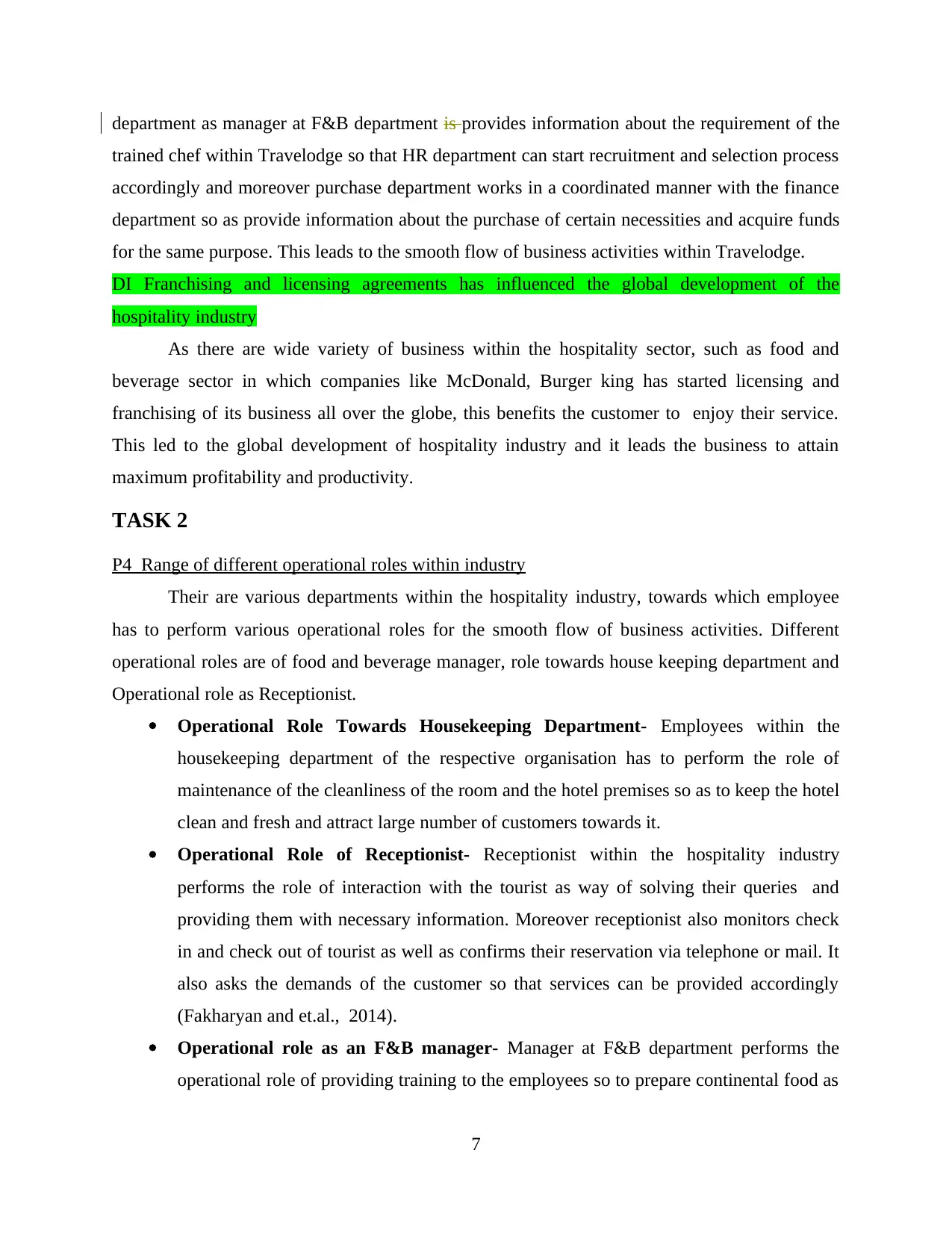
department as manager at F&B department is provides information about the requirement of the
trained chef within Travelodge so that HR department can start recruitment and selection process
accordingly and moreover purchase department works in a coordinated manner with the finance
department so as provide information about the purchase of certain necessities and acquire funds
for the same purpose. This leads to the smooth flow of business activities within Travelodge.
DI Franchising and licensing agreements has influenced the global development of the
hospitality industry
As there are wide variety of business within the hospitality sector, such as food and
beverage sector in which companies like McDonald, Burger king has started licensing and
franchising of its business all over the globe, this benefits the customer to enjoy their service.
This led to the global development of hospitality industry and it leads the business to attain
maximum profitability and productivity.
TASK 2
P4 Range of different operational roles within industry
Their are various departments within the hospitality industry, towards which employee
has to perform various operational roles for the smooth flow of business activities. Different
operational roles are of food and beverage manager, role towards house keeping department and
Operational role as Receptionist.
Operational Role Towards Housekeeping Department- Employees within the
housekeeping department of the respective organisation has to perform the role of
maintenance of the cleanliness of the room and the hotel premises so as to keep the hotel
clean and fresh and attract large number of customers towards it.
Operational Role of Receptionist- Receptionist within the hospitality industry
performs the role of interaction with the tourist as way of solving their queries and
providing them with necessary information. Moreover receptionist also monitors check
in and check out of tourist as well as confirms their reservation via telephone or mail. It
also asks the demands of the customer so that services can be provided accordingly
(Fakharyan and et.al., 2014).
Operational role as an F&B manager- Manager at F&B department performs the
operational role of providing training to the employees so to prepare continental food as
7
trained chef within Travelodge so that HR department can start recruitment and selection process
accordingly and moreover purchase department works in a coordinated manner with the finance
department so as provide information about the purchase of certain necessities and acquire funds
for the same purpose. This leads to the smooth flow of business activities within Travelodge.
DI Franchising and licensing agreements has influenced the global development of the
hospitality industry
As there are wide variety of business within the hospitality sector, such as food and
beverage sector in which companies like McDonald, Burger king has started licensing and
franchising of its business all over the globe, this benefits the customer to enjoy their service.
This led to the global development of hospitality industry and it leads the business to attain
maximum profitability and productivity.
TASK 2
P4 Range of different operational roles within industry
Their are various departments within the hospitality industry, towards which employee
has to perform various operational roles for the smooth flow of business activities. Different
operational roles are of food and beverage manager, role towards house keeping department and
Operational role as Receptionist.
Operational Role Towards Housekeeping Department- Employees within the
housekeeping department of the respective organisation has to perform the role of
maintenance of the cleanliness of the room and the hotel premises so as to keep the hotel
clean and fresh and attract large number of customers towards it.
Operational Role of Receptionist- Receptionist within the hospitality industry
performs the role of interaction with the tourist as way of solving their queries and
providing them with necessary information. Moreover receptionist also monitors check
in and check out of tourist as well as confirms their reservation via telephone or mail. It
also asks the demands of the customer so that services can be provided accordingly
(Fakharyan and et.al., 2014).
Operational role as an F&B manager- Manager at F&B department performs the
operational role of providing training to the employees so to prepare continental food as
7
Paraphrase This Document
Need a fresh take? Get an instant paraphrase of this document with our AI Paraphraser
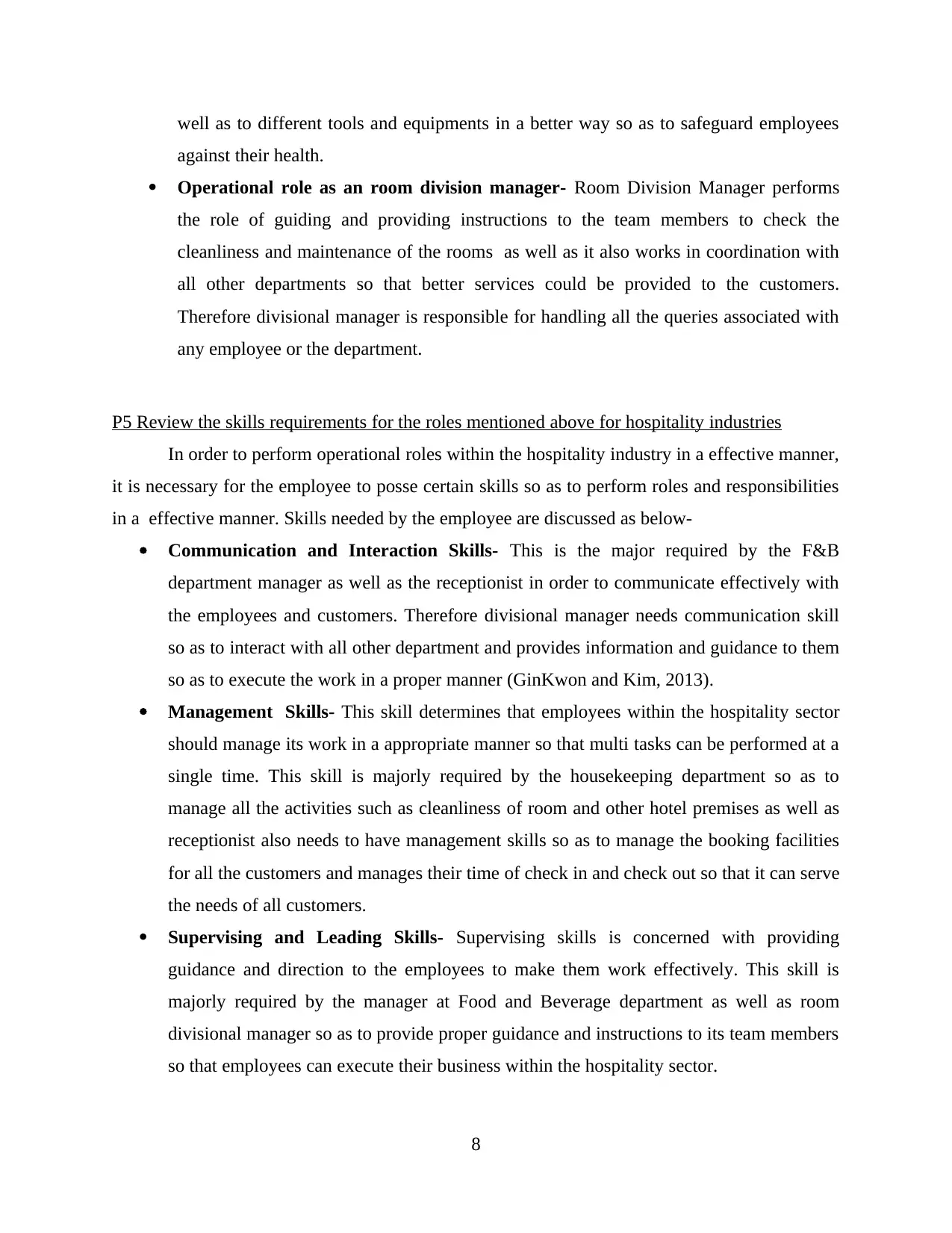
well as to different tools and equipments in a better way so as to safeguard employees
against their health.
Operational role as an room division manager- Room Division Manager performs
the role of guiding and providing instructions to the team members to check the
cleanliness and maintenance of the rooms as well as it also works in coordination with
all other departments so that better services could be provided to the customers.
Therefore divisional manager is responsible for handling all the queries associated with
any employee or the department.
P5 Review the skills requirements for the roles mentioned above for hospitality industries
In order to perform operational roles within the hospitality industry in a effective manner,
it is necessary for the employee to posse certain skills so as to perform roles and responsibilities
in a effective manner. Skills needed by the employee are discussed as below-
Communication and Interaction Skills- This is the major required by the F&B
department manager as well as the receptionist in order to communicate effectively with
the employees and customers. Therefore divisional manager needs communication skill
so as to interact with all other department and provides information and guidance to them
so as to execute the work in a proper manner (GinKwon and Kim, 2013).
Management Skills- This skill determines that employees within the hospitality sector
should manage its work in a appropriate manner so that multi tasks can be performed at a
single time. This skill is majorly required by the housekeeping department so as to
manage all the activities such as cleanliness of room and other hotel premises as well as
receptionist also needs to have management skills so as to manage the booking facilities
for all the customers and manages their time of check in and check out so that it can serve
the needs of all customers.
Supervising and Leading Skills- Supervising skills is concerned with providing
guidance and direction to the employees to make them work effectively. This skill is
majorly required by the manager at Food and Beverage department as well as room
divisional manager so as to provide proper guidance and instructions to its team members
so that employees can execute their business within the hospitality sector.
8
against their health.
Operational role as an room division manager- Room Division Manager performs
the role of guiding and providing instructions to the team members to check the
cleanliness and maintenance of the rooms as well as it also works in coordination with
all other departments so that better services could be provided to the customers.
Therefore divisional manager is responsible for handling all the queries associated with
any employee or the department.
P5 Review the skills requirements for the roles mentioned above for hospitality industries
In order to perform operational roles within the hospitality industry in a effective manner,
it is necessary for the employee to posse certain skills so as to perform roles and responsibilities
in a effective manner. Skills needed by the employee are discussed as below-
Communication and Interaction Skills- This is the major required by the F&B
department manager as well as the receptionist in order to communicate effectively with
the employees and customers. Therefore divisional manager needs communication skill
so as to interact with all other department and provides information and guidance to them
so as to execute the work in a proper manner (GinKwon and Kim, 2013).
Management Skills- This skill determines that employees within the hospitality sector
should manage its work in a appropriate manner so that multi tasks can be performed at a
single time. This skill is majorly required by the housekeeping department so as to
manage all the activities such as cleanliness of room and other hotel premises as well as
receptionist also needs to have management skills so as to manage the booking facilities
for all the customers and manages their time of check in and check out so that it can serve
the needs of all customers.
Supervising and Leading Skills- Supervising skills is concerned with providing
guidance and direction to the employees to make them work effectively. This skill is
majorly required by the manager at Food and Beverage department as well as room
divisional manager so as to provide proper guidance and instructions to its team members
so that employees can execute their business within the hospitality sector.
8
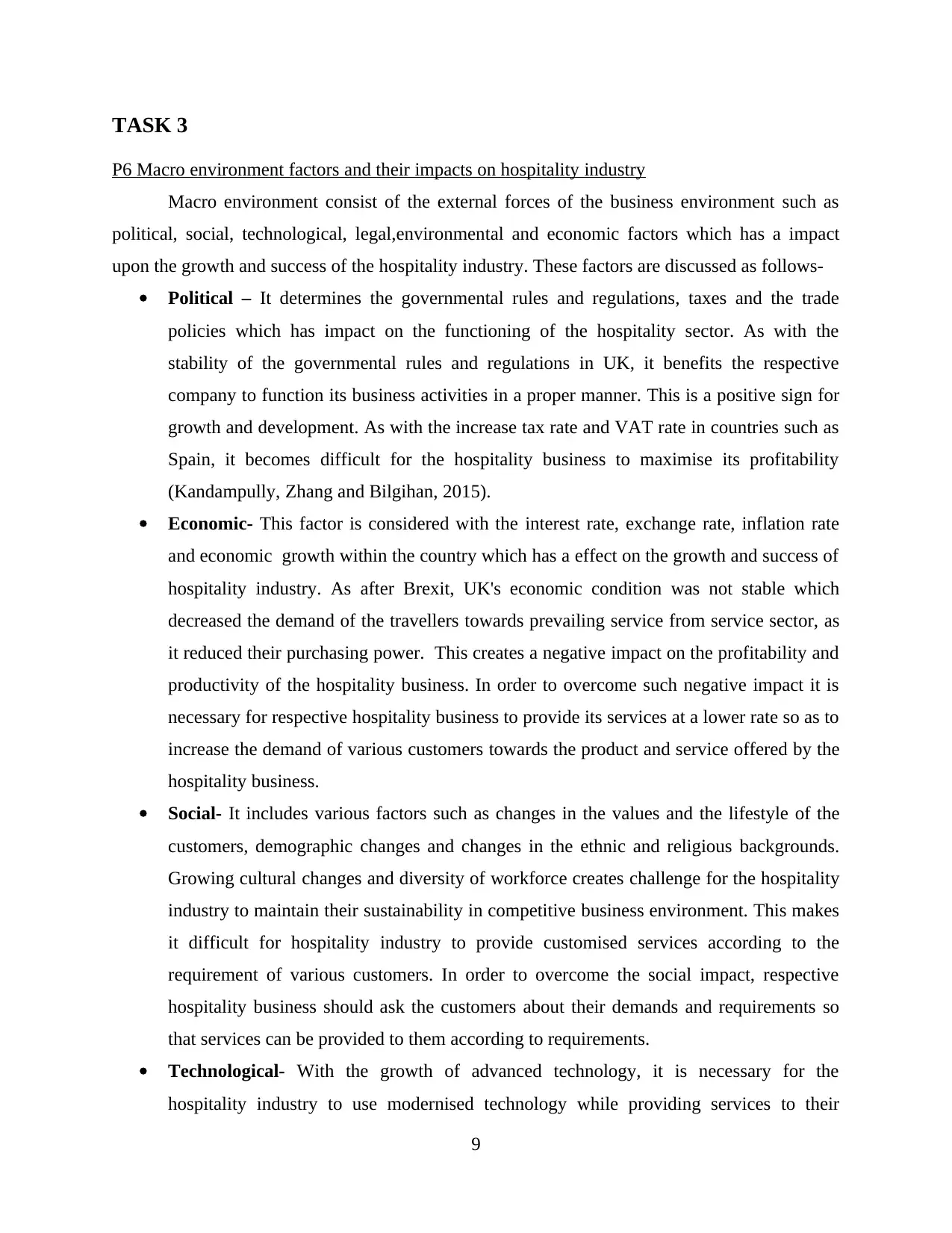
TASK 3
P6 Macro environment factors and their impacts on hospitality industry
Macro environment consist of the external forces of the business environment such as
political, social, technological, legal,environmental and economic factors which has a impact
upon the growth and success of the hospitality industry. These factors are discussed as follows-
Political – It determines the governmental rules and regulations, taxes and the trade
policies which has impact on the functioning of the hospitality sector. As with the
stability of the governmental rules and regulations in UK, it benefits the respective
company to function its business activities in a proper manner. This is a positive sign for
growth and development. As with the increase tax rate and VAT rate in countries such as
Spain, it becomes difficult for the hospitality business to maximise its profitability
(Kandampully, Zhang and Bilgihan, 2015).
Economic- This factor is considered with the interest rate, exchange rate, inflation rate
and economic growth within the country which has a effect on the growth and success of
hospitality industry. As after Brexit, UK's economic condition was not stable which
decreased the demand of the travellers towards prevailing service from service sector, as
it reduced their purchasing power. This creates a negative impact on the profitability and
productivity of the hospitality business. In order to overcome such negative impact it is
necessary for respective hospitality business to provide its services at a lower rate so as to
increase the demand of various customers towards the product and service offered by the
hospitality business.
Social- It includes various factors such as changes in the values and the lifestyle of the
customers, demographic changes and changes in the ethnic and religious backgrounds.
Growing cultural changes and diversity of workforce creates challenge for the hospitality
industry to maintain their sustainability in competitive business environment. This makes
it difficult for hospitality industry to provide customised services according to the
requirement of various customers. In order to overcome the social impact, respective
hospitality business should ask the customers about their demands and requirements so
that services can be provided to them according to requirements.
Technological- With the growth of advanced technology, it is necessary for the
hospitality industry to use modernised technology while providing services to their
9
P6 Macro environment factors and their impacts on hospitality industry
Macro environment consist of the external forces of the business environment such as
political, social, technological, legal,environmental and economic factors which has a impact
upon the growth and success of the hospitality industry. These factors are discussed as follows-
Political – It determines the governmental rules and regulations, taxes and the trade
policies which has impact on the functioning of the hospitality sector. As with the
stability of the governmental rules and regulations in UK, it benefits the respective
company to function its business activities in a proper manner. This is a positive sign for
growth and development. As with the increase tax rate and VAT rate in countries such as
Spain, it becomes difficult for the hospitality business to maximise its profitability
(Kandampully, Zhang and Bilgihan, 2015).
Economic- This factor is considered with the interest rate, exchange rate, inflation rate
and economic growth within the country which has a effect on the growth and success of
hospitality industry. As after Brexit, UK's economic condition was not stable which
decreased the demand of the travellers towards prevailing service from service sector, as
it reduced their purchasing power. This creates a negative impact on the profitability and
productivity of the hospitality business. In order to overcome such negative impact it is
necessary for respective hospitality business to provide its services at a lower rate so as to
increase the demand of various customers towards the product and service offered by the
hospitality business.
Social- It includes various factors such as changes in the values and the lifestyle of the
customers, demographic changes and changes in the ethnic and religious backgrounds.
Growing cultural changes and diversity of workforce creates challenge for the hospitality
industry to maintain their sustainability in competitive business environment. This makes
it difficult for hospitality industry to provide customised services according to the
requirement of various customers. In order to overcome the social impact, respective
hospitality business should ask the customers about their demands and requirements so
that services can be provided to them according to requirements.
Technological- With the growth of advanced technology, it is necessary for the
hospitality industry to use modernised technology while providing services to their
9
⊘ This is a preview!⊘
Do you want full access?
Subscribe today to unlock all pages.

Trusted by 1+ million students worldwide
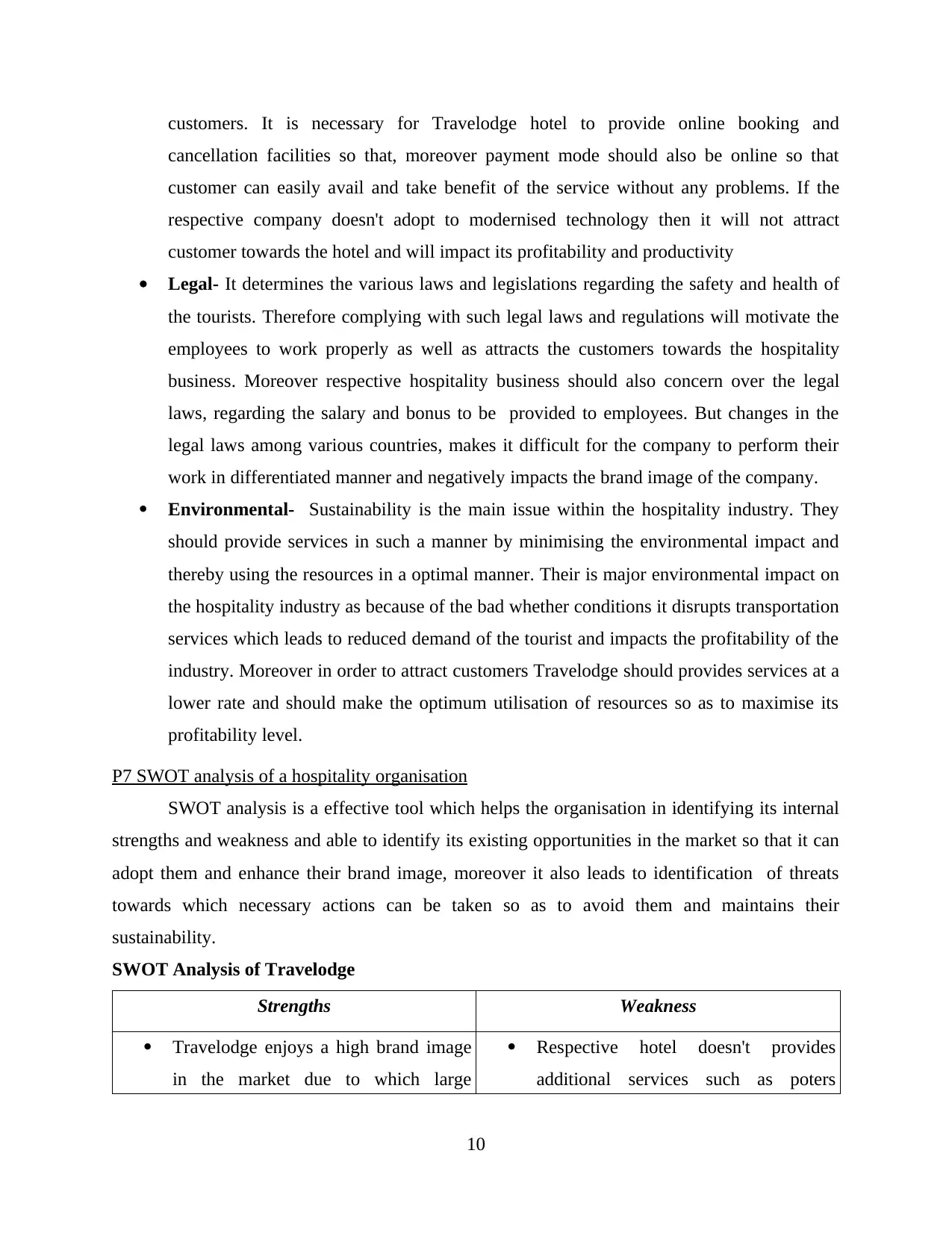
customers. It is necessary for Travelodge hotel to provide online booking and
cancellation facilities so that, moreover payment mode should also be online so that
customer can easily avail and take benefit of the service without any problems. If the
respective company doesn't adopt to modernised technology then it will not attract
customer towards the hotel and will impact its profitability and productivity
Legal- It determines the various laws and legislations regarding the safety and health of
the tourists. Therefore complying with such legal laws and regulations will motivate the
employees to work properly as well as attracts the customers towards the hospitality
business. Moreover respective hospitality business should also concern over the legal
laws, regarding the salary and bonus to be provided to employees. But changes in the
legal laws among various countries, makes it difficult for the company to perform their
work in differentiated manner and negatively impacts the brand image of the company.
Environmental- Sustainability is the main issue within the hospitality industry. They
should provide services in such a manner by minimising the environmental impact and
thereby using the resources in a optimal manner. Their is major environmental impact on
the hospitality industry as because of the bad whether conditions it disrupts transportation
services which leads to reduced demand of the tourist and impacts the profitability of the
industry. Moreover in order to attract customers Travelodge should provides services at a
lower rate and should make the optimum utilisation of resources so as to maximise its
profitability level.
P7 SWOT analysis of a hospitality organisation
SWOT analysis is a effective tool which helps the organisation in identifying its internal
strengths and weakness and able to identify its existing opportunities in the market so that it can
adopt them and enhance their brand image, moreover it also leads to identification of threats
towards which necessary actions can be taken so as to avoid them and maintains their
sustainability.
SWOT Analysis of Travelodge
Strengths Weakness
Travelodge enjoys a high brand image
in the market due to which large
Respective hotel doesn't provides
additional services such as poters
10
cancellation facilities so that, moreover payment mode should also be online so that
customer can easily avail and take benefit of the service without any problems. If the
respective company doesn't adopt to modernised technology then it will not attract
customer towards the hotel and will impact its profitability and productivity
Legal- It determines the various laws and legislations regarding the safety and health of
the tourists. Therefore complying with such legal laws and regulations will motivate the
employees to work properly as well as attracts the customers towards the hospitality
business. Moreover respective hospitality business should also concern over the legal
laws, regarding the salary and bonus to be provided to employees. But changes in the
legal laws among various countries, makes it difficult for the company to perform their
work in differentiated manner and negatively impacts the brand image of the company.
Environmental- Sustainability is the main issue within the hospitality industry. They
should provide services in such a manner by minimising the environmental impact and
thereby using the resources in a optimal manner. Their is major environmental impact on
the hospitality industry as because of the bad whether conditions it disrupts transportation
services which leads to reduced demand of the tourist and impacts the profitability of the
industry. Moreover in order to attract customers Travelodge should provides services at a
lower rate and should make the optimum utilisation of resources so as to maximise its
profitability level.
P7 SWOT analysis of a hospitality organisation
SWOT analysis is a effective tool which helps the organisation in identifying its internal
strengths and weakness and able to identify its existing opportunities in the market so that it can
adopt them and enhance their brand image, moreover it also leads to identification of threats
towards which necessary actions can be taken so as to avoid them and maintains their
sustainability.
SWOT Analysis of Travelodge
Strengths Weakness
Travelodge enjoys a high brand image
in the market due to which large
Respective hotel doesn't provides
additional services such as poters
10
Paraphrase This Document
Need a fresh take? Get an instant paraphrase of this document with our AI Paraphraser
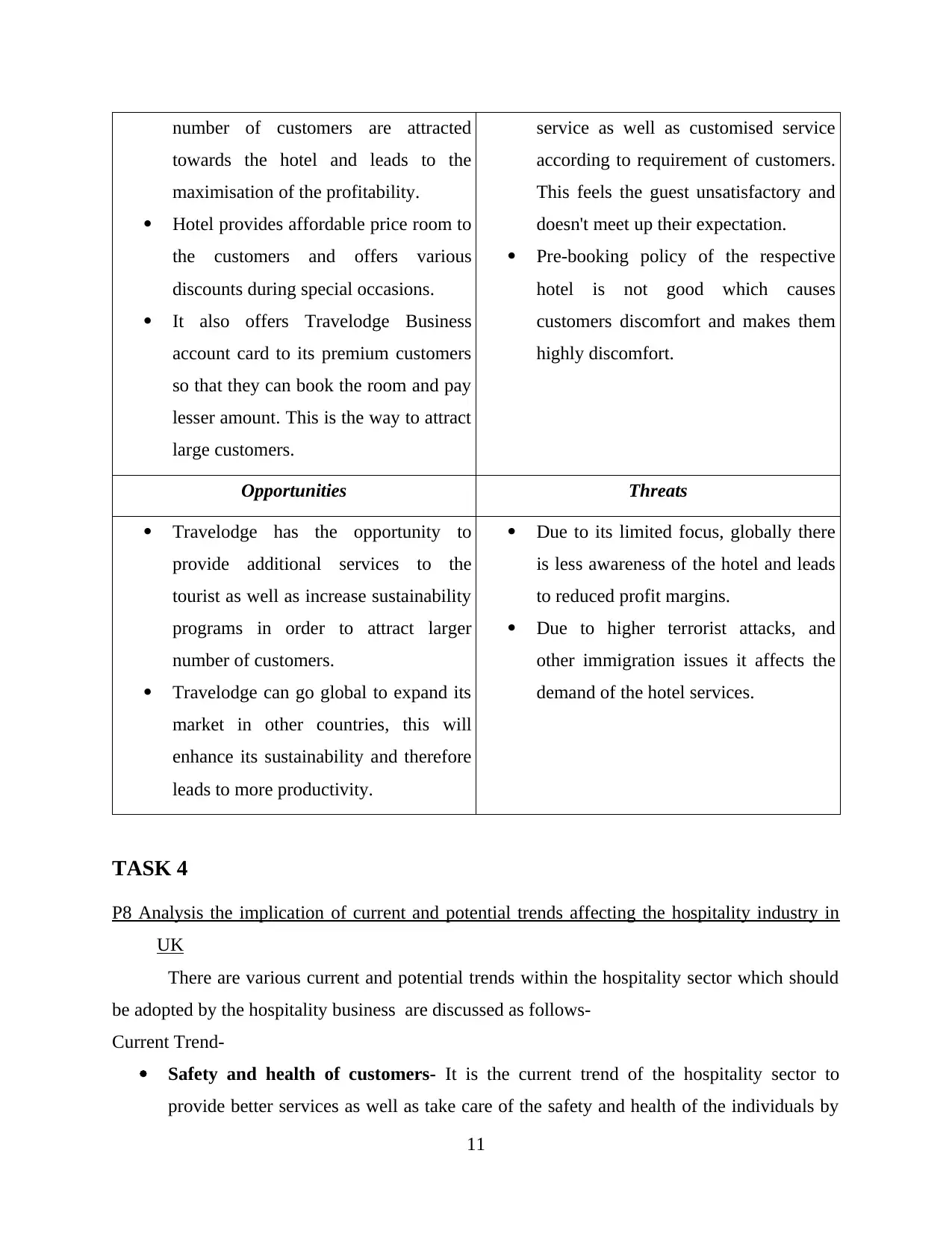
number of customers are attracted
towards the hotel and leads to the
maximisation of the profitability.
Hotel provides affordable price room to
the customers and offers various
discounts during special occasions.
It also offers Travelodge Business
account card to its premium customers
so that they can book the room and pay
lesser amount. This is the way to attract
large customers.
service as well as customised service
according to requirement of customers.
This feels the guest unsatisfactory and
doesn't meet up their expectation.
Pre-booking policy of the respective
hotel is not good which causes
customers discomfort and makes them
highly discomfort.
Opportunities Threats
Travelodge has the opportunity to
provide additional services to the
tourist as well as increase sustainability
programs in order to attract larger
number of customers.
Travelodge can go global to expand its
market in other countries, this will
enhance its sustainability and therefore
leads to more productivity.
Due to its limited focus, globally there
is less awareness of the hotel and leads
to reduced profit margins.
Due to higher terrorist attacks, and
other immigration issues it affects the
demand of the hotel services.
TASK 4
P8 Analysis the implication of current and potential trends affecting the hospitality industry in
UK
There are various current and potential trends within the hospitality sector which should
be adopted by the hospitality business are discussed as follows-
Current Trend-
Safety and health of customers- It is the current trend of the hospitality sector to
provide better services as well as take care of the safety and health of the individuals by
11
towards the hotel and leads to the
maximisation of the profitability.
Hotel provides affordable price room to
the customers and offers various
discounts during special occasions.
It also offers Travelodge Business
account card to its premium customers
so that they can book the room and pay
lesser amount. This is the way to attract
large customers.
service as well as customised service
according to requirement of customers.
This feels the guest unsatisfactory and
doesn't meet up their expectation.
Pre-booking policy of the respective
hotel is not good which causes
customers discomfort and makes them
highly discomfort.
Opportunities Threats
Travelodge has the opportunity to
provide additional services to the
tourist as well as increase sustainability
programs in order to attract larger
number of customers.
Travelodge can go global to expand its
market in other countries, this will
enhance its sustainability and therefore
leads to more productivity.
Due to its limited focus, globally there
is less awareness of the hotel and leads
to reduced profit margins.
Due to higher terrorist attacks, and
other immigration issues it affects the
demand of the hotel services.
TASK 4
P8 Analysis the implication of current and potential trends affecting the hospitality industry in
UK
There are various current and potential trends within the hospitality sector which should
be adopted by the hospitality business are discussed as follows-
Current Trend-
Safety and health of customers- It is the current trend of the hospitality sector to
provide better services as well as take care of the safety and health of the individuals by
11
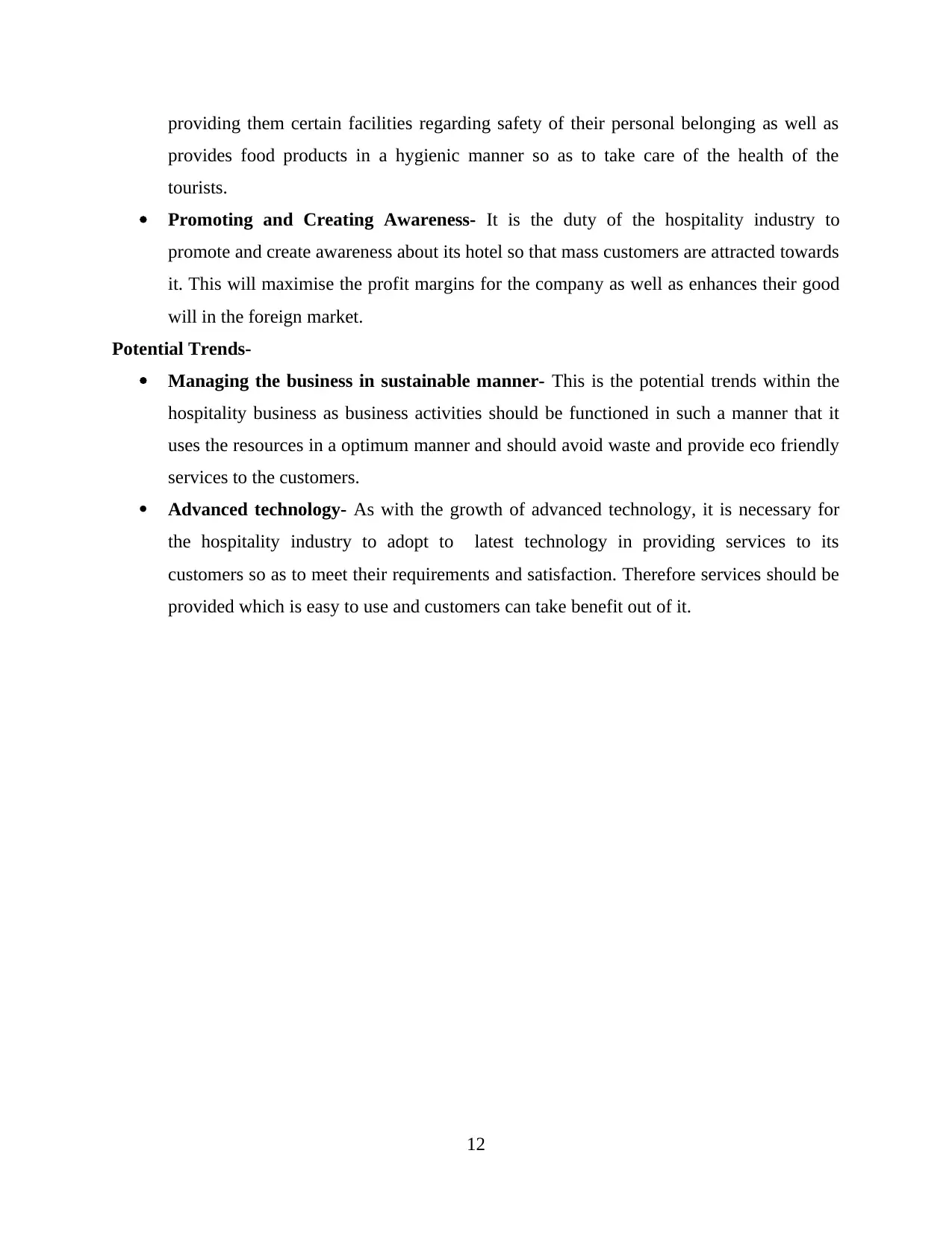
providing them certain facilities regarding safety of their personal belonging as well as
provides food products in a hygienic manner so as to take care of the health of the
tourists.
Promoting and Creating Awareness- It is the duty of the hospitality industry to
promote and create awareness about its hotel so that mass customers are attracted towards
it. This will maximise the profit margins for the company as well as enhances their good
will in the foreign market.
Potential Trends-
Managing the business in sustainable manner- This is the potential trends within the
hospitality business as business activities should be functioned in such a manner that it
uses the resources in a optimum manner and should avoid waste and provide eco friendly
services to the customers.
Advanced technology- As with the growth of advanced technology, it is necessary for
the hospitality industry to adopt to latest technology in providing services to its
customers so as to meet their requirements and satisfaction. Therefore services should be
provided which is easy to use and customers can take benefit out of it.
12
provides food products in a hygienic manner so as to take care of the health of the
tourists.
Promoting and Creating Awareness- It is the duty of the hospitality industry to
promote and create awareness about its hotel so that mass customers are attracted towards
it. This will maximise the profit margins for the company as well as enhances their good
will in the foreign market.
Potential Trends-
Managing the business in sustainable manner- This is the potential trends within the
hospitality business as business activities should be functioned in such a manner that it
uses the resources in a optimum manner and should avoid waste and provide eco friendly
services to the customers.
Advanced technology- As with the growth of advanced technology, it is necessary for
the hospitality industry to adopt to latest technology in providing services to its
customers so as to meet their requirements and satisfaction. Therefore services should be
provided which is easy to use and customers can take benefit out of it.
12
⊘ This is a preview!⊘
Do you want full access?
Subscribe today to unlock all pages.

Trusted by 1+ million students worldwide
1 out of 14
Related Documents
Your All-in-One AI-Powered Toolkit for Academic Success.
+13062052269
info@desklib.com
Available 24*7 on WhatsApp / Email
![[object Object]](/_next/static/media/star-bottom.7253800d.svg)
Unlock your academic potential
Copyright © 2020–2026 A2Z Services. All Rights Reserved. Developed and managed by ZUCOL.





